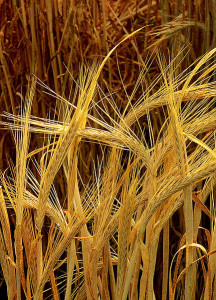The Lilith Blog 1 of 2
May 8, 2014 by Molly Moses
Counting the Omer Through Poetry

Barley sheaves (Wikimedia Commons)
Lilith editor in chief Susan Weidman Schneider asks, “Is counting a women’s preoccupation? Counting days before one’s period, counting the months of pregnancy, counting the years til menopause. Perhaps counting the Omer, the days between Pesach and Shavuot, can become a time when the counting provides another kind of embodied pacing.”
Harvard Divinity School student Molly Moses has a unique approach to counting and contemplating the Omer, which she’s shared with us.
Molly Moses: Counting the Omer through Poetry
The Omer is a 49-day period–a period of seven weeks–leading from the second night of Passover to the holiday of Shavuot, which today serves annually to commemorate God’s giving of the Torah to Israel. (The word “omer” itself refers to the measurement of barley offered up at the Temple on the first day of this period.) Both Leviticus and Deuteronomy relate a commandment to count these days. Some people choose to enhance their counting with reflection and self-cultivation in preparation for receiving the Torah. Rabbi Karyn Kedar’s new book “Omer: A Counting” offers a spiritual guide.
Like Advent and Lent within the Christian tradition, the counting of the Omer, for me, is a practice in mindful, measured anticipation. Having benefited from short courses taught by Alicia Ostriker and the KlezKanada Poetry Retreat team of Adeena Karasick and Jake Marmer, I decided to write a poem to mark each day of the Omer last year. Drawing inspiration from poet Hank Lazer’s experimentation with form, I decided that each line would have the same number of words as the number of the day. My two other rules were that I could not write in advance and that I could not edit afterward; day-ness became both a discipline and a meditation. The resulting poems varied in quality as well as content, reflecting both my passing thoughts and the ebbs and flows of time and energy resources. I often used kabbalistic concepts associated with each day as prompts, making heavy use of Rabbi Jill Hammer’s “Omer Calendar of Biblical Women.” In what is now an annual practice, my Omer poetry has acted as a deeply personal, yet public journal, a way to make myself externalize thoughts on–and thus to keep wrestling with–God, doubt, truth, beauty, ritual, human relationship, and other experiences of daily life that, without the encouraging structural rigor of this time period, I find hard to record and contemplate with diligence.
Library dreams. Stir awake, turn head. My love disappears between bookshelves.
Refocus. Tamira has taken up residence in the next chair over.
Swing around, legs over armrest. We watch a squirrel recover food.
Are you all right? she says. Your toes are red, she says.
They’re warm, she says. Mental note for shidduch resume: warm feet.
Come here, she says. Obligingly lean forward. Hand upon my forehead.
You’re warm, she says. You’ve got a fever, dear, she says.
I say Whenever I think I might have a fever and
ask someone if I have a fever I never actually have
a fever It’s funny It makes me feel special when I
actually have a fever It’s like relationships and I go silent.
I say I’m going to write today’s Omer poem about this.
Dedicate it to me, my friend says. I say I will.
27.4.14
 Please wait...
Please wait...